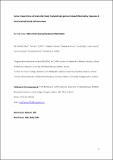| dc.contributor.author | Islam, Md Nahidul | |
| dc.contributor.author | Griffin, Tomás P. | |
| dc.contributor.author | Sander, Elizabeth | |
| dc.contributor.author | Rocks, Stephanie | |
| dc.contributor.author | Qazi, Junaid | |
| dc.contributor.author | Cabral, Joana | |
| dc.contributor.author | McCaul, Jasmin | |
| dc.contributor.author | McMorrow, Tara | |
| dc.contributor.author | Griffin, Matthew D. | |
| dc.date.accessioned | 2021-01-06T11:38:49Z | |
| dc.date.available | 2021-01-06T11:38:49Z | |
| dc.date.issued | 2019-11-19 | |
| dc.identifier.citation | Islam, Md Nahidul, Griffin, Tomás P., Sander, Elizabeth, Rocks, Stephanie, Qazi, Junaid, Cabral, Joana, McCaul, Jasmin, McMorrow, Tara, Griffin, Matthew D. (2019). Human mesenchymal stromal cells broadly modulate high glucose-induced inflammatory responses of renal proximal tubular cell monolayers. Stem Cell Research & Therapy, 10(1), 329. doi:10.1186/s13287-019-1424-5 | en_IE |
| dc.identifier.issn | 1757-6512 | |
| dc.identifier.uri | http://hdl.handle.net/10379/16413 | |
| dc.description.abstract | Background: Renal proximal tubular epithelial cells (RPTEC) are dysfunctional in diabetic kidney disease (DKD). Mesenchymal stromal cells (MSC) may modulate DKD pathogenesis through anti-inflammatory mediators. This study aimed to investigate the pro-inflammatory effect of extended exposure to high glucose (HG) concentration on stable RPTEC monolayers and the influence of MSC on this response.Methods: Morphologically stable human RPTEC/TERT1 cell monolayers were exposed to 5 mM and 30 mM (HG) D-glucose or to 5 mM D-glucose + 25 mM D-mannitol (MAN) for 5 days with sequential immunoassays of supernatants and end-point transcriptomic analysis by RNA sequencing. Under the same conditions, MSC-conditioned media (MSC-CM) or MSC-containing transwells were added for days 4-5. Effects of CM from HG- and MAN-exposed RPTEC/MSC co-cultures on cytokine secretion by monocyte-derived macrophages were determined.Results: After 72-80 h, HG resulted in increased RPTEC/TERT1 release of interleukin (IL)-6, IL-8, monocyte chemoattractant protein (MCP)-1 and neutrophil gelatinase-associated lipocalin (NGAL). The HG pro-inflammatory effect was attenuated by concentrated (10x) MSC-CM and, to a greater extent, by MSC transwell co-culture. Bioinformatics analysis of RNA sequencing data confirmed a predominant effect of HG on inflammation-related mediators and biological processes/KEGG pathways in RPTEC/TERT1 stable monolayers as well as the non-contact-dependent anti-inflammatory effect of MSC. Finally, CM from HG-exposed RPTEC/MSC transwell co-cultures was associated with attenuated secretion of inflammatory mediators by macrophages compared to CM from HG-stimulated RPTEC alone.Conclusions: Stable RPTEC monolayers demonstrate delayed pro-inflammatory response to HG that is attenuated by close proximity to human MSC. In DKD, this MSC effect has potential to modulate hyperglycemia-associated RPTEC/macrophage cross-talk. | en_IE |
| dc.description.sponsorship | The research was supported by a grant from the European Commission [Horizon 2020 Collaborative Health Project NEPHSTROM (grant number 634086; TPG, MNI, MDG)]. Other funding sources that contributed to the work were grants from the European Commission [FP7 Collaborative Health Project VISICORT (grant number 602470; MDG, JC)], from Science Foundation Ireland [REMEDI Strategic Research Cluster (grant number 09/SRC-B1794; MDG) and CÚRAM Research Centre (grant number 13/RC/2073; MDG)], from the Health Research board of Ireland (grant number HRA_POR/2013/341; JC, MDG) and the European Regional Development Fund. TPG is supported by a Hardiman Scholarship from the College of Medicine, Nursing and Health Science, National University of Ireland Galway and a bursary from the Irish Endocrine Society/Royal College of Physicians of Ireland. JMcC and TMcM are funded by Science Foundation Ireland (grant number 12/IP/1686) and by the School of Biomolecular and Biomedical Science, University College Dublin. | en_IE |
| dc.format | application/pdf | en_IE |
| dc.language.iso | en | en_IE |
| dc.publisher | BMC | en_IE |
| dc.relation.ispartof | Stem Cell Research & Therapy | en |
| dc.rights | Attribution-NonCommercial-NoDerivs 3.0 Ireland | |
| dc.rights.uri | https://creativecommons.org/licenses/by-nc-nd/3.0/ie/ | |
| dc.subject | MONOCYTE CHEMOATTRACTANT PROTEIN-1 | en_IE |
| dc.subject | FACTOR-KAPPA-B | en_IE |
| dc.subject | INDUCED DIABETIC-NEPHROPATHY | en_IE |
| dc.subject | EPITHELIAL-CELLS | en_IE |
| dc.subject | STEM-CELLS | en_IE |
| dc.subject | THERAPEUTIC TARGET | en_IE |
| dc.subject | KIDNEY | en_IE |
| dc.subject | INJURY | en_IE |
| dc.subject | ACTIVATION | en_IE |
| dc.subject | EXPRESSION | en_IE |
| dc.title | Human mesenchymal stromal cells broadly modulate high glucose-induced inflammatory responses of renal proximal tubular cell monolayers | en_IE |
| dc.type | Article | en_IE |
| dc.date.updated | 2020-12-20T09:16:00Z | |
| dc.identifier.doi | 10.1186/s13287-019-1424-5 | |
| dc.local.publishedsource | https://doi.org/10.1186/s13287-019-1424-5 | en_IE |
| dc.description.peer-reviewed | peer-reviewed | |
| dc.contributor.funder | Horizon 2020 | en_IE |
| dc.contributor.funder | Seventh Framework Programme | en_IE |
| dc.contributor.funder | Science Foundation Ireland | en_IE |
| dc.contributor.funder | Health Research Board | en_IE |
| dc.contributor.funder | European Regional Development Fund | en_IE |
| dc.contributor.funder | Hardiman Research Scholarship, National University of Ireland Galway | en_IE |
| dc.contributor.funder | Irish Endocrine Society/Royal College of Physicians of Ireland | en_IE |
| dc.internal.rssid | 19576301 | |
| dc.local.contact | Matthew Dallas Griffin, Remedi, Biomedical Sciences Buil, Corrib Village, Dangan, Nui Galway. 5436 Email: matthew.griffin@nuigalway.ie | |
| dc.local.copyrightchecked | Yes | |
| dc.local.version | ACCEPTED | |
| dcterms.project | info:eu-repo/grantAgreement/EC/H2020::RIA/634086/EU/Novel Stromal Cell Therapy for Diabetic Kidney Disease/NEPHSTROM | en_IE |
| dcterms.project | info:eu-repo/grantAgreement/EC/FP7::SP1::HEALTH/602470/EU/Adverse Immune Signatures and their Prevention in Corneal Transplantation/VISICORT | en_IE |
| dcterms.project | info:eu-repo/grantAgreement/SFI/SFI Strategic Research Cluster/09/SRC/B1794/IE/SRC REMEDI: REMEDI-2: From Research to Human Therapy/ | en_IE |
| dcterms.project | info:eu-repo/grantAgreement/SFI/SFI Research Centres/13/RC/2073/IE/C�RAM - Centre for Research in Medical Devices/ | en_IE |
| dcterms.project | info:eu-repo/grantAgreement/SFI/SFI Investigator Programme/12/IP/1686/IE/Molecular mechanisms of cilia loss in mammalian epithelial cells/ | en_IE |
| nui.item.downloads | 644 | |


